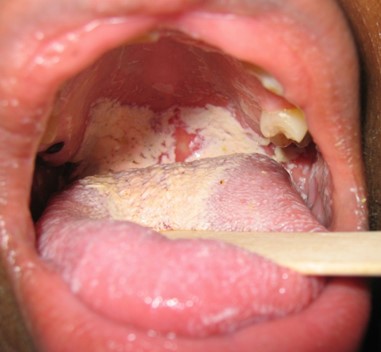A nurse is assessing a child who has nephrotic syndrome. Which of the following findings should the nurse expect?
Smokey brown urine.
Facial edema.
Hypertension.
Polyuria.
The Correct Answer is B
Nephrotic syndrome is a kidney disorder that causes your body to pass too much protein in your urine.
Swelling around the eyes is the most common sign of nephrotic syndrome in children 2.
Choice A is incorrect because smokey brown urine is not a symptom of nephrotic syndrome.
Choice C is incorrect because hypertension (high blood pressure) is a complication of nephrotic syndrome, not a symptom.
Choice D is incorrect because polyuria (frequent urination) is not a symptom of nephrotic syndrome.
Nursing Test Bank
Naxlex Comprehensive Predictor Exams
Related Questions
Correct Answer is B
Explanation
The nurse should suspect candidiasis, also known as oral thrush.
Candidiasis is a fungal infection that can occur in the mouth and is characterized by the presence of a white, milky plaque that does not come off with rubbing.
The child’s use of antibiotics, immunosuppressants, and corticosteroids can increase the risk of developing candidiasis.
Choice A is incorrect because dermatitis is an inflammation of the skin and
would not present as a white plaque in the mouth.
Choice C is incorrect because herpes simplex typically presents as painful blisters or sores in the mouth.
Choice D is incorrect because squamous cell carcinoma typically presents as a firm, painless growth, or ulcer in the mouth.

Correct Answer is D
Explanation
a.Log rolling is an appropriate technique to reposition a postoperative scoliosis repair patient as it minimizes stress on the spine and helps maintain spinal alignment. Patients need frequent repositioning to prevent pressure ulcers and promote comfort, but every 4 hours may not be frequent enough; typically, every 2 hours is recommended.
b.Protective isolation is not typically required for patients undergoing scoliosis surgery unless they have specific risk factors for infection (e.g., immunocompromised status). Standard postoperative care focuses on monitoring for infection at the surgical site rather than isolation unless indicated by the patient's condition.
c.While it’s important to elevate the head of the bed to assist with breathing and comfort, after scoliosis surgery, the head of the bed is generally elevated to 30-45° to facilitate lung expansion and reduce the risk of aspiration. However, it should be ensured that this angle does not compromise spinal alignment, especially in the early postoperative period.
d.The use of a patient-controlled analgesia (PCA) pump is an appropriate intervention for pain management after scoliosis surgery. It allows the patient to self-administer pain medication within prescribed limits, leading to more effective pain management, improved patient satisfaction, and potentially reduced need for supplemental analgesics.
Whether you are a student looking to ace your exams or a practicing nurse seeking to enhance your expertise , our nursing education contents will empower you with the confidence and competence to make a difference in the lives of patients and become a respected leader in the healthcare field.
Visit Naxlex, invest in your future and unlock endless possibilities with our unparalleled nursing education contents today
Report Wrong Answer on the Current Question
Do you disagree with the answer? If yes, what is your expected answer? Explain.
Kindly be descriptive with the issue you are facing.
